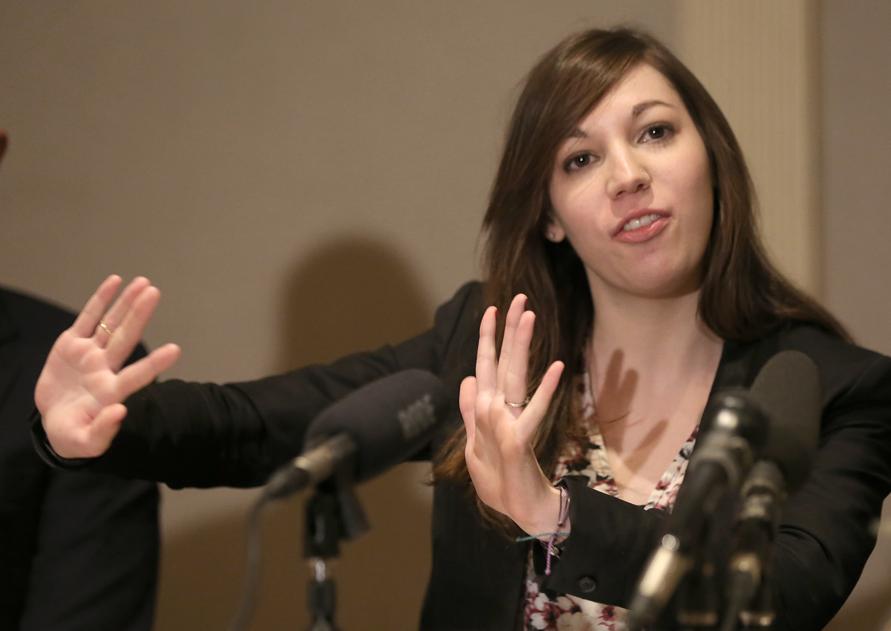
CAMBRIDGE — A recent Harvard graduate has sued the university over claims that school officials failed to take seriously her allegations of sexual assault by another student, leaving her to live in fear in the same dormitory as her alleged abuser.
Alyssa Leader, who graduated in 2015, called for a culture change at Harvard so others in her situation will have their cases taken more seriously.
“Harvard doesn’t want to hear from survivors because Harvard doesn’t want to admit that it has a sexual assault problem,’’ Leader said Wednesday at a news conference in the Sheraton Commander Hotel in Harvard Square. “Acknowledging the problem, and that it’s more widespread or complicated than they’re aware, means they’d have to take actions that would be difficult.’’
The lawsuit shines a light on a touchy issue for Harvard. Federal investigators began scrutinizing the university in 2014 for failing to properly handle sexual assault allegations, and as the investigation continues, the university has already reformed its policies and services.
The lawsuit, filed Tuesday in US District Court in Boston, says that despite those reforms, Harvard officials failed to protect Leader from repeated retaliation by the alleged abuser and discouraged her from filing a formal complaint. The suit seeks unspecified damages and attorney fees.
“My hope is that no one else will have the experience that I had,’’ she said. “I hear my story over and over and over again from different people.’’
Harvard officials said the school does not comment on pending litigation, but called the prevalence of sexual harassment and assault at Harvard and elsewhere “deeply disturbing.’’
“Harvard responds fairly and purposefully to every allegation of sexual assault among its students, faculty, and staff,’’ the school said in a statement.
About 25.5 percent of undergraduate women at Harvard who took part in a national survey last year said they had experienced some form of sexual assault.
University officials have targeted all-male, elite social clubs, known as final clubs, as part of their effort to curb assault, but Leader said her assailant and his friends were not members.
“The university has taken this tactic of kind of pushing all of the assault problems onto the final clubs, but my experience has very much been that assault happens everywhere on campus, in lots of different ways, and many times, or most times, the clubs aren’t even involved,’’ Leader said.
Leader’s attorney, Irwin Zalkin, said colleges can be reluctant to acknowledge claims of sexual assault because they can risk losing federal funding for not responding properly.
“There’s an incentive for them to engage in these silent agreements,’’ Zalkin said at the news conference.
The 29-page complaint explains how Leader’s alleged assailant, whom she met as a sophomore and began dating, would become irate and threatening toward her when she resisted him, slamming doors and pushing furniture.
The man, called John Doe 1 in the suit, would also come to her workplace, a cafe in their Cabot House dormitory where he also worked, and yell at her or walk back and forth outside the window. Doe’s friends would sit outside her job so she would have to pass by them when she left, Leader said.
She said she carried pepper spray in her dormitory, never sat with her back to a door, and blocked doors when she went in rooms alone. “I was living in constant fear,’’ she said.
Leader’s academic work suffered and she struggled to finish her academic thesis, according to the lawsuit. She also dropped shifts at the cafe, avoided the dining hall, and slept elsewhere, and she was barred from social events after Doe told people she had reported abuse, the complaint says.
Over a two-year period beginning in 2013, the suit says, Leader reported the assault and harassment many times to various university authorities including sexual assault specialists, campus police, and dorm leaders. Ultimately, a month before she graduated, the alleged abuser was moved out of the dorm, something Leader called “too little, too late.’’
According to Leader’s lawyers, the college took action only after Leader obtained a formal restraining order in April 2015 in district court. A few months after she graduated, the school dismissed her complaints, finding no ground for punishment, the suit said.
Laura Krantz can be reached at laura.krantz@globe.com. Follow her on Twitter @laurakrantz.



